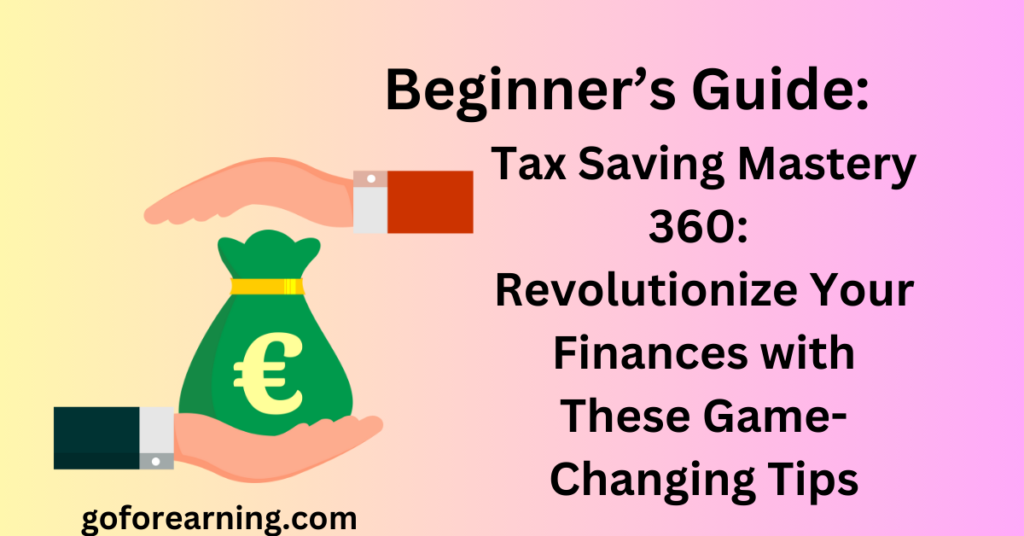Explore the complex world of tax savings with professional ideas and tactics that promise to revolutionize your financial environment in this comprehensive a post. This article provides a 360-degree picture of tax-saving strategies, from capturing the complexity of tax law to mastering smart investments for maximum efficiency.
Introduction
Tax savings can be a game-changer for people who want to make the most of their money in today’s constantly changing world of personal finance. The full book “Tax Saving Mastery 360” will help you understand the difficult world of taxes and make your finances better. This article shows you a bunch of new, cutting-edge tips that will give you the information and tools you need to save more money and have a safer financial future.
Tax Saving Mastery 360 Degree Technique

Figuring Out the Tax Jargon
The first step to good tax planning is to understand the terms used in taxes. This chapter breaks down difficult terms and provides an easy-to-understand guide to the language of taxes. Find out how the terms you use affect your bottom line, from exclusions and taxes to credits and returns.
Planning for Making Money

Look into creative ways to handle your money that don’t involve standard pay systems. Find out how combining different sources of income, using smart business methods, and making the most of passive income streams can help you save a lot of money on taxes.
Showing Off Hidden Deductions
Look into the world of deductions, which is often ignored. Find discounts and credits that not many people know about that can help you lower your taxed income by a lot. You can get tax breaks for things like a home office or credits for school. Find out how to use these little-known benefits.
Investing to Save on Taxes
Find out how to invest in a way that minimizes your taxes. This chapter talks about ways to spend your money that will not only give you benefits but also help you pay the least amount of taxes on your earnings. Find out how to make your investments work harder for you by learning about things like tax-advantaged funds and planned asset allocation.
A New Way to Plan for Retirement
Think about how you can save on taxes when you plan for retirement. Look into tax-advantaged retirement accounts, ways to contribute, and ways to receive money that can help you get the most money in retirement while paying the least amount of taxes.
Successes of Entrepreneurs
This chapter talks about ways for business owners and traders to save money on taxes that are specific to their situation. Get the most out of your business to save the most on taxes. For example, use business costs to your advantage and take advantage of tax credits.
The Pros of Living in the Digital Age
In this age of digital activities, it is very important to know how online income and virtual assets affect your taxes. Look into ways to save on taxes in the digital world, whether you’re into e-commerce, freelance, or investing in cryptocurrencies.
In short, This last part of “Tax Saving Mastery 360” goes over some important points and tells you what you can do to start getting better with money. By using these tips, you can completely change the way you handle your money, and tax season will become a chance to save a lot of money and be financially successful in the long run. Take charge of your financial future by making decisions based on accurate information.
How to pay zero tax in India?
It’s vital to remember that tax laws and regulations are subject to change, so be sure you’re following the rules in your area. Attempting to avoid taxes is also unlawful and may result in significant repercussions. There are, nevertheless, lawful methods to reduce your tax obligation. Individuals in India may choose to examine the following broad strategies:
Utilize Tax Deductions and Exemptions:
- Take advantage of deductions available under Section 80C for investments in instruments like PPF, ELSS, and National Savings Certificates (NSC).
- Claim deductions for expenses like medical insurance premiums (Section 80D) and home loan interest (Section 24).
Invest in Tax-Saving Instruments:
- To take advantage of tax breaks, consider investing in tax-saving vehicles such as Public Provident Fund (PPF), Equity Linked Savings Scheme (ELSS), and National Pension System (NPS).
HRA (House Rent Allowance):
- If you are a salaried person and you reside in rented property, you are eligible to receive housing allowance (HRA).
Agricultural Income:
- In most cases, income from agricultural activities is free from income tax. If you have income from agriculture, this might be a strategy to lower the amount of income that is subject to taxation.
Tax-Free Bonds:
- Invest in bonds given out by government agencies that are exempt from taxation. The interest that is generated on these bonds is exempt from taxation.
Gifts and Inheritances:
- Generally speaking, gifts that are received from certain relatives are free from taxation. Furthermore, inherited assets can be subject to a variety of tax ramifications.
Tax Planning through Family Members:
- It is important to divide the income among the members of the family, particularly if they are in lower tax categories.
Start a Business:
- It is possible to organize the income from a firm in a manner that reduces the amount of taxes owed. It is recommended that you seek the advice of a tax specialist.
Tax Exemptions for Specific Incomes:
- Individuals may be excused from paying income tax on certain kinds of income, including income from agricultural activities and certain dividends.
Invest in Tax-Free Instruments:
- Certain financial instruments, such as the Employees’ Provident Fund (EPF) and the Public Provident Fund (PPF), provide for returns that are exempt from taxation.
For the purpose of ensuring that your financial planning is in accordance with the most recent tax rules and regulations, it is strongly suggested that you seek the advice of a trained tax expert or financial counselor. Obtaining expert guidance is essential in order to successfully navigate the tax regulations, which may be difficult to understand and are subject to change. When managing your tax burden, you should always give legal and ethical measures the highest priority.
How can I save 100% income tax?
It is essential to make it clear that it is not feasible to save one hundred percent of one’s income tax payments using lawful measures. For the purpose of funding public services and infrastructure, it is mandatory for every person to donate a percentage of their income to the government in the form of taxes. It is possible to face serious repercussions, such as being fined and facing legal action, if you attempt to avoid paying taxes by using unlawful tactics.
On the other hand, there are legitimate methods to reduce the amount of taxes you owe, and people have the potential to take advantage of a wide range of deductions, exemptions, and credits that are made available by the tax rules. The objective is not to completely do away with taxes; rather, it is to maximize your tax status while still adhering to the legal requirements. The following are some tactics that are legal:
Utilize Tax Deductions:
- Take use of the deductions that are available under several parts of the Income Tax Act, such as Section 80C for investments, Section 80D for health insurance payments, and Section 24 for paying the interest on a home loan.
Tax-Exempt Investments:
- For the purpose of obtaining deductions and exemptions, it is recommended that you make investments in tax-saving instruments such as the Public Provident Fund (PPF), Equity Linked Savings Scheme (ELSS), and National Pension System (NPS).
HRA and Other Allowances:
- If you are a salaried person, you should take advantage of the House Rent Allowance (HRA) as well as any other allowances that may be free from taxation.
Tax Planning through Family Members:
- In order to take advantage of the lower tax rates and exemptions that are available to each person, it is recommended that income be distributed among family members.
Utilize Capital Gains Exemptions:
- If you have income from capital gains, you should investigate the exclusions that are available under sections such as Section 54 for property and Section 54F for other assets.
Business Deductions:
- If you own a company, you should make sure that you can lower your taxable income by claiming all of the business deductions that are available to you.
Gifts and Inheritances:
- Generally speaking, gifts that are received from certain relatives are free from taxation. Furthermore, inherited assets can be subject to a variety of tax ramifications.
Tax Planning with Investments:
- Select investment opportunities that are tax-efficient and organize your portfolio in a manner that reduces the amount of taxes you owe.
It is important to keep in mind that the key to optimizing your tax status is to participate in tax planning that is both legal and ethical. It is recommended that you seek the advice of a competent tax expert or a financial counselor in order to guarantee that your tax plan is in accordance with the most recent laws and regulations. Always make compliance and transparency your top priorities in order to prevent any legal problems in the future.
FAQs:
Q1: How can “Tax Saving Mastery 360” help me understand complex tax terms?
A1: “Tax Saving Mastery 360” breaks down difficult tax terms, providing an easy-to-understand guide in the first chapter. It helps you grasp how these terms impact your finances, covering everything from exclusions and taxes to credits and returns.
Q2: What does the book suggest regarding handling money in non-traditional ways to save on taxes?
A2: Explore creative methods for handling money beyond conventional pay systems. The book advises on combining diverse income sources, utilizing smart business strategies, and optimizing passive income streams to achieve significant tax savings.
Q3: How does the book uncover hidden deductions to reduce taxed income?
A3: “Tax Saving Mastery 360” delves into often-overlooked deductions, revealing discounts and credits that can substantially lower your taxed income. It highlights benefits like home office deductions and school credits, guiding you on leveraging these lesser-known advantages.
Q4: What insights does the book provide on investing to minimize taxes?
A4: The book details strategies for tax-efficient investing, guiding you on spending money in ways that not only yield benefits but also minimize taxes on earnings. It covers topics such as tax-advantaged funds and planned asset allocation to make your investments work harder for you.
Q5: How does the book address tax planning for retirement?
A5: “Tax Saving Mastery 360” shows you how to save money on taxes while saving for retirement. It explores tax-advantaged retirement accounts, contribution methods, and ways to receive money, helping you maximize retirement funds while minimizing tax obligations.





